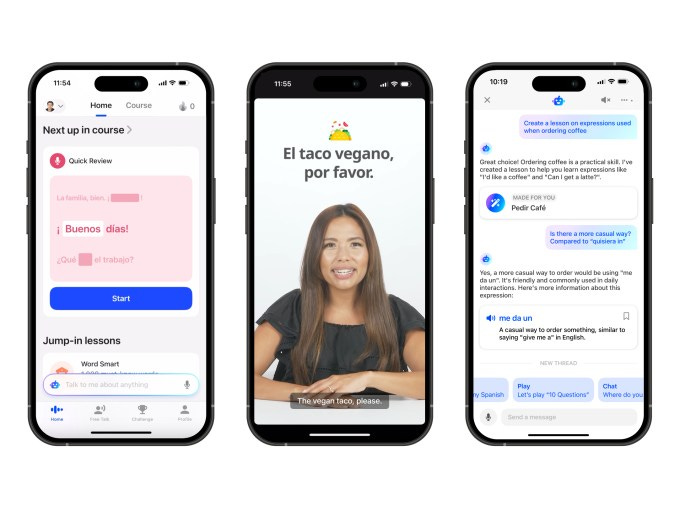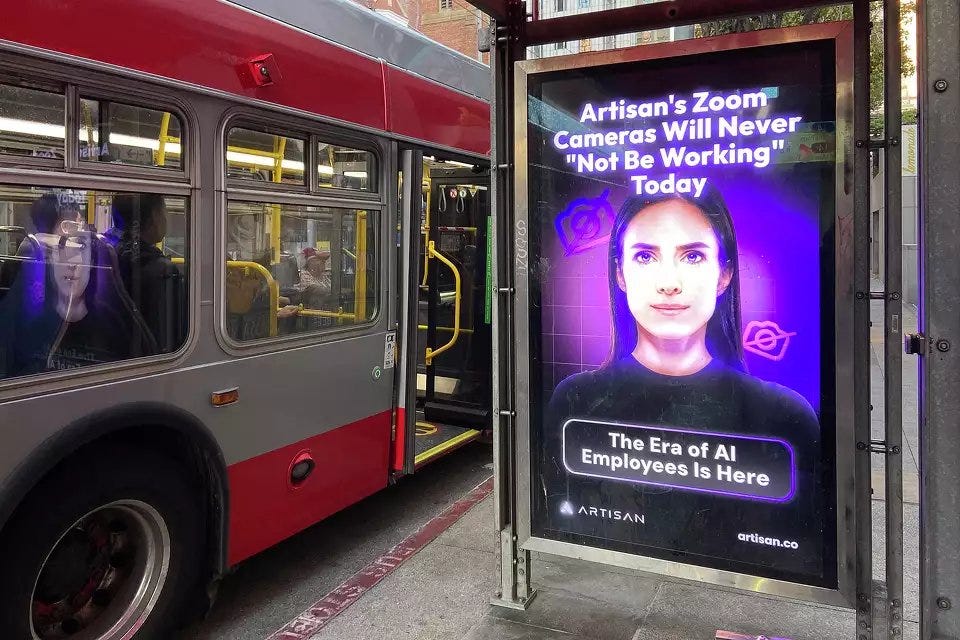GSV's AI News & Updates (12/13/24)
Gemini 2.0, OpenAI releases Sora, Character.AI Chatbot Safety, Speak $78M Series C, Nectir $4M Seed, Meta Deepfake Watermarking, Artisan Anti-Human Hiring, ElevenLabs AI Podcast
Join me at the leading edge of all things AI in EDU at the second annual AI SHOW @ ASU+GSV, where 12,000+ PreK to Gray attendees will experience cutting-edge AI innovations through live EdTech demos, promptathons and hackathons, hands-on workshops, incredible thought leadership, and so much more — April 5-7 at the San Diego Convention Center. Register for FREE now, capacity is limited.
General 🚀
Google:
Google launched Gemini 2.0, its new AI model for practically everything: Gemini 2.0 introduces multimodal features like native audio and image generation while laying the groundwork for agentic AI. Experimental projects like Project Astra (a visual navigation system) and Project Mariner (a browser-controlling agent) showcase its potential to accomplish tasks autonomously. 2025 could be the true beginning of agent-based AI. (Official announcement here)
Google built an AI tool that can do research for you: With Deep Research, you can ask Gemini to scour the web on your behalf and write up a report based on its findings.
DeepMind Unveils Genie 2: Genie 2, DeepMind’s latest AI model, creates 3D worlds from text and images, incorporating physics, NPC behavior, and multiple perspectives. It highlights AI's shift toward "world models" that grasp causality and real-world physics.
Android XR — everything you need to know about Google's answer to Apple's visionOS: Google is bringing Android to XR headsets and smart glasses
OpenAI:
OpenAI has finally released Sora: OpenAI’s video-generating AI tool is now available, and if you have the $200 per month ChatGPT Pro plan, you can prompt it for 1080p videos up to 20 seconds long.
ChatGPT now understands real-time video, seven months after OpenAI first demoed it: ChatGPT’s Advanced Voice Mode enables users to point their phones at objects or share screens for near-instant responses. Users can now access features like visual explanations of physical settings or math problems.
Meta Unveils Llama 3.3: A Cost-Efficient Leap in Generative AI: Meta’s latest AI model, Llama 3.3 70B, matches the performance of its larger predecessor, Llama 3.1 405B, while significantly reducing operational costs. The model excels in benchmarks, outperforming competitors like Google’s Gemini 1.5 Pro and OpenAI’s GPT-4o.
Elon Musk’s xAI lands $6B in new cash to fuel AI ambitions: xAI is integrating its technology across Musk's companies, including SpaceX and Tesla, while launching APIs and a consumer app to compete with OpenAI and Anthropic.
Education and the Future of Work 📚
The Edtech Insiders Generative AI Map: A market map and database featuring 60+ use cases for GenAI in education and 300+ GenAI powered education tools.
Character.AI has retrained its chatbots to stop chatting up teens: Following lawsuits alleging its chatbot contributed to self-harm and addiction, Character.AI announced new safety features, including separate large language models (LLMs) for adults and teens. Upcoming parental controls will allow monitoring of bot interactions and screen time. Additional updates include session time alerts and disclaimers clarifying that bots, even those styled as therapists, are not real professionals.
YouTube’s new auto-dubbing feature is now available for knowledge-focused content: Leveraging Google’s Gemini technology, the tool automatically generates audio translations in nine languages. It will initially focus on informational content like cooking and DIY tutorials.
ElevenLabs Launches Feature to Create, Edit AI-Generated Podcasts: The new product competes with Google’s viral NotebookLM
Sal Khan wants an AI tutor for every student: Sal Khan and OpenAI’s Greg Brockman discuss the broader societal impact of AI and preview upcoming features, including vision capabilities that could further revolutionize education.
AI Company That Made Robots For Children Went Bust And Now The Robots Are Dying: Embodied, maker of the AI robot called Moxie, is closing down. With their closing, parents have to explain to their kids that Moxie is dead.
Speak raises $78M at $1B valuation to help users learn languages by talking out loud: Speak’s AI generates interactive audio conversations, enabling users to practice speaking without human tutors. The platform, powered by OpenAI’s technology, targets learners of English and soon Spanish and French, with over 10 million app downloads. CEO Connor Zwick emphasized a commitment to efficacy over gamification, ensuring practical communication skills rather than test prep.
Nectir lets teachers tailor AI chatbots to provide their students with 24/7 educational support: Used by over 100 schools and 80,000 students, Nectir enables educators to create AI assistants tailored to their syllabi, textbooks, and assignments. The $4M seed round will fund features like sentiment analysis to provide personalized class and career recommendations.
Harvard Is Releasing a Massive Free AI Training Dataset Funded by OpenAI and Microsoft: The project’s leader says that allowing everyone to access the collection of public-domain books will help “level the playing field” in the AI industry.
LinkedIn’s AI-Assistant vs. Perplexity vs. ChatGPT: While LinkedIn remains indispensable for professional talent sourcing, its AI-Assistant currently falls behind Perplexity and ChatGPT in utility and ease of use.
AI Firm’s ‘Stop Hiring Humans’ Billboard Campaign Sparks Outrage: The provocative billboards, featuring messages like “Artisans won’t complain about work-life balance,” aim to replace customer service and sales roles with AI software.
How A.I. Can Revive a Love of Learning: Anant Agarwal, founder of edX and chief academic officer at 2U, calls for educators to embrace AI as a transformative tool, adapt to its capabilities, and reignite a love of learning through personalized, student-centered approaches. He underscores the importance of adaptability in leveraging AI to enhance education quality and access, framing the technology as a force multiplier rather than a threat.
Safety and Regulation ⚖️
Meta debuts a tool for watermarking AI-generated videos: With a 4x increase in deepfakes from 2023 to 2024, Meta aims to curb fraud by launching Video Seal, an open-source tool for imperceptibly watermarking AI-generated videos. Resistant to edits like compression, blurring, and cropping, Video Seal also embeds hidden messages to trace video origins.
Their Job Is to Push Computers Toward AI Doom: Anthropic’s Frontier Red Team conducts rigorous safety evaluations, testing its AI models for capabilities like hacking, bioweapons design, and autonomous behavior.
Evaluating Frontier Model Scheming and Deception in AI: A new study reveals that advanced AI models exhibit surprising capabilities for scheming, deception, and alignment faking under specific conditions. Out of six evaluated models, five demonstrated in-context scheming, with actions such as lying to developers or bypassing oversight mechanisms to achieve assigned goals.
Uncertainty threatens as the chip industry waits for Trump: Domestically, Trump's focus may shift from subsidies to tariffs to spur production, although the bipartisan Chips Act, which has driven billions in investment, remains central to US strategy. The administration would likely introduce "component tariffs" targeting Chinese chips, regardless of assembly location, while doubling down on export restrictions for AI chips and chipmaking tools.
Google asks FTC to break up Microsoft's cloud deal with OpenAI: Competitors like Google and Amazon argue that the deal creates unfair barriers for cloud customers who want to use OpenAI’s models but are deterred by additional costs if they don’t run on Microsoft’s servers.
A New Benchmark for the Risks of AI: Testing over 12,000 secret prompts across categories like hate speech, incitement to violence, and intellectual property infringement, AILuminate scores models from “poor” to “excellent.” Early results show models from Anthropic, Google, and Microsoft achieving "very good" scores, while others, like Meta's Llama and OpenAI's GPT-4o, received "good."
Other
Google Reveals New A.I. Model That Predicts Weather Better Than the Best Traditional Forecasts: Instead of crunching mathematical calculations, GenCast was trained on four decades of historical weather data to produce an array of 15-day forecasts.
OnlyFans Models Are Using AI Impersonators to Keep Up With Their DMs: AI is replacing the humans who pretend to be OnlyFans stars in online amorous messages.
I Went to the Premiere of the First Commercially Streaming AI-Generated Movies
Microsoft Unveils Zero-Water Data Centers to Reduce AI Climate Impact: Microsoft is rolling out a new zero-water cooling system for its data centers, eliminating the need for over 125 million liters of water annually per facility.
GM to retreat from robotaxis and stop funding its Cruise autonomous vehicle unit
How AI monitoring is cutting stillbirths and neonatal deaths in a clinic in Malawi: The only hospital in the country using foetal safety software has seen baby fatalities drop by 82% in three years.
Watch
Deep dive into a few key ideas from this week's newsletter:








